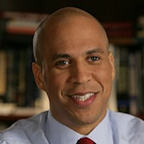Congressional Republicans are on the verge of passing their disastrous tax bill. Don’t believe for a minute that it will “trickle down” to workers.
President Trump and Congressional Republicans are now on the verge of passing a disastrous tax plan into law that will raise taxes for millions of low-and middle-income workers and threaten critical programs that make our economy fairer and stronger — all to give a tax break to large corporations and the wealthiest Americans.
There are many, many reasons why this legislation is so bad — among them, the drastic reduction of a state income and local property tax deduction claimed by many middle class families in high cost-of-living states like New Jersey; an expanded estate tax loophole exempting more very wealthy families from taxation; and more favorable tax treatment of corporations than of individuals and families.
But there’s one aspect of the Congressional Republican tax effort I want to focus on here that speaks to a broader troubling trend in our economy.
As defenders of the plan twist themselves into knots trying to rationalize their support, they often rely on the flawed and disproven rationale that a massive corporate tax break is the key to getting large corporations to hire more workers, hand out raises, and unleash unprecedented economic growth. It’s not.
Their plan, and this kind of thinking, is a fundamental and costly misdiagnosis of the problems facing workers across the country and is plainly the wrong way to address them.
After all, corporations are making higher profits today than they have in over 80 years, and yet, the average worker’s wages are at their lowest point in over six decades. When major corporations see higher earnings or an influx in capital, it is far more likely that their executives and shareholders — and not their frontline workers — will see the benefit.
If we’re serious about empowering American workers and strengthening the Middle Class, we can start by addressing the pervading culture among financial institutions and across industry that prioritizes short-term shareholder value over long-term workforce investments.
Take the case of American Airlines. Earlier this year, after posting $234 million in first quarter net earnings, American announced that it would give pay raises to its pilots and flight attendants.
American’s decision — a recognition that recruiting and retaining talent is integral to its long-term success — was promptly slammed by financial analysts.
Morgan Stanley downgraded American Airlines shares on news of the raise, arguing that it “establishes a worrying precedent, in our view, both for American and the industry.” An analyst for Citigroup complained: “labor is being paid first again, shareholders get leftovers.” And in response to this market reaction, American Airlines’ shares lost more than 8 percent in value — or about $1.9 billion in market value over the next two days.
This not-so-subtle warning being sent by Wall Street to companies considering pay raises and other types of workforce investment is devastating for our economy and undermines basic economic fairness.
Despite record profits, investing in the long-term success of their companies and employees through things like pay raises, pathways to promotion, and innovation has become the exception, not the rule, for too many major corporations. Case in point: according to economist William Lazonick, between 2003 and 2012 companies on the S&P 500 dedicated 91 percent of total earnings to stock buybacks and dividends, leaving just nine percent for things like workforce investment and R&D. Before the 1970s, that earnings split was about 50/50.
There is no evidence to suggest that the GOP tax plan — which hands 80 percent of its cuts to corporations, business owners, and the very wealthiest Americans — will somehow reverse this trend and lead to higher wages.
And workers will need a raise if this bill comes to pass: the nonpartisan Joint Committee on Taxation found that Americans making less than $75,000 will on average see a tax increase under the Senate-passed version of the bill.
Instead of handing massive tax cuts to large corporations and repeating the falsehood that it will somehow trickle down to workers, Congress should be talking about how to shift the focus away from the next stock buyback and toward the long-term success of American workers and our economy.
Our modern economy was built on the compact between employer and employee, that if you work hard, you could get ahead. But today, that compact is broken as companies look to their workforce as a target to lower costs, not as an investment to train and empower for the long haul. Too many employers are failing to hold up their end of the bargain, and Republicans in Congress want to reward them with a trillion dollar check.
Trickle-down economics, no matter how it’s disguised, doesn’t work. Republicans’ attempt to camouflage it as “tax reform” is cynical, deeply harmful, and certainly won’t do anything to repair the significant breaches in big businesses’ contract with the American worker.
